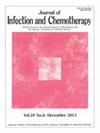Real-world experience of tixagevimab/cilgavimab prophylaxis in Japanese patients with immunodeficiency
IF 1.9
4区 医学
Q3 INFECTIOUS DISEASES
引用次数: 0
Abstract
Background
Severe acute respiratory syndrome coronavirus 2 (SARS-CoV-2) causes severe illness and mortality in patients with immunodeficiency. Although vaccination has been recommended, the induction of protective antibodies by immunization, and thus the disease-preventive effect, has proven insufficient in immunodeficient patients, especially in those with predominantly antibody deficiency. A monoclonal antibody combination of tixagevimab and cilgavimab (TIX/CIL) was developed as a pre-exposure prophylaxis (PrEP). In this study, we investigated the post-PrEP increase in antiviral antibody titers and detailed the breakthrough infections that occurred despite PrEP in Japanese immunodeficient patients who had received TIX/CIL.
Methods
Blood samples were collected before and after TIX/CIL administration between November 2022 and August 2023. Antibody titers against the S-protein of SARS-CoV-2 were measured to evaluate TIX/CIL-induced protection. Information regarding breakthrough infection, as evidenced by positive antigen and/or PCR tests, was collected.
Results
A significant increase in the anti-S antibody titer was observed in all 89 immunodeficient patients who had received TIX/CIL. However, 14 (16 %) patients experienced breakthrough SARS-CoV-2 infections, of which one died of respiratory failure.
Conclusion
The shift in the SARS-CoV-2 circulating strain might have reduced the efficacy of TIX/CIL, leading to an increased number of breakthrough infections.
日本免疫缺陷患者使用替沙吉维单抗/西加维单抗预防的实际经验
背景:严重急性呼吸综合征冠状病毒2 (SARS-CoV-2)在免疫缺陷患者中引起严重疾病和死亡。虽然建议接种疫苗,但事实证明,免疫缺陷患者,特别是主要是抗体缺乏的患者,通过免疫诱导保护性抗体,从而产生预防疾病的效果是不够的。开发了一种tixagevimab和cilgavimab联合单克隆抗体(TIX/CIL)作为暴露前预防(PrEP)。在这项研究中,我们调查了PrEP后抗病毒抗体滴度的增加,并详细介绍了在接受TIX/CIL治疗的日本免疫缺陷患者中,尽管PrEP仍发生的突破性感染。方法:于2022年11月至2023年8月期间,采集患者TIX/CIL用药前后的血样。检测SARS-CoV-2 s蛋白抗体滴度,评价TIX/ cil诱导的保护作用。收集了抗原阳性和/或聚合酶链反应试验证明的突破性感染信息。结果:89例接受TIX/CIL治疗的免疫缺陷患者抗s抗体滴度均显著升高。然而,14例(16%)患者出现突破性的SARS-CoV-2感染,其中1例死于呼吸衰竭。结论:SARS-CoV-2流行毒株的转移可能降低了TIX/CIL的疗效,导致突破性感染人数增加。
本文章由计算机程序翻译,如有差异,请以英文原文为准。
求助全文
约1分钟内获得全文
求助全文
来源期刊

Journal of Infection and Chemotherapy
INFECTIOUS DISEASES-PHARMACOLOGY & PHARMACY
CiteScore
4.10
自引率
4.50%
发文量
303
审稿时长
47 days
期刊介绍:
The Journal of Infection and Chemotherapy (JIC) — official journal of the Japanese Society of Chemotherapy and The Japanese Association for Infectious Diseases — welcomes original papers, laboratory or clinical, as well as case reports, notes, committee reports, surveillance and guidelines from all parts of the world on all aspects of chemotherapy, covering the pathogenesis, diagnosis, treatment, and control of infection, including treatment with anticancer drugs. Experimental studies on animal models and pharmacokinetics, and reports on epidemiology and clinical trials are particularly welcome.
 求助内容:
求助内容: 应助结果提醒方式:
应助结果提醒方式:


